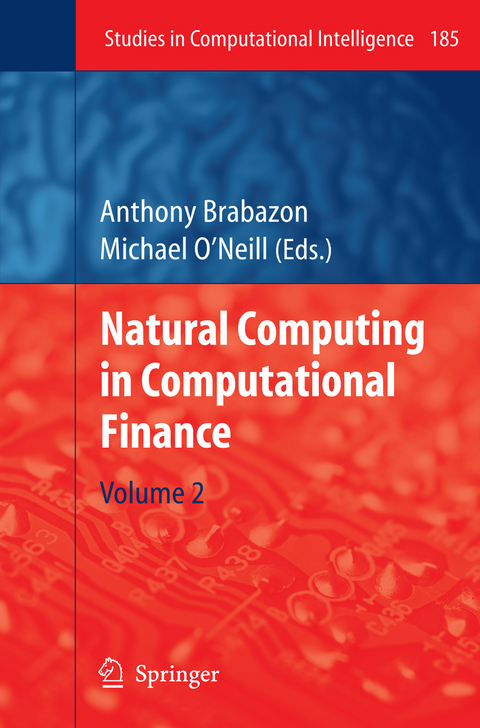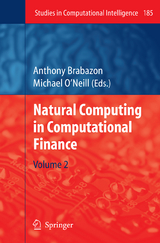Natural Computing in Computational Finance
Springer Berlin (Verlag)
978-3-540-95973-1 (ISBN)
Recent years have seen the widespread application of Natural Computing algorithms (broadly defined in this context as computer algorithms whose design draws inspiration from phenomena in the natural world) for the purposes of financial modelling and optimisation. A related stream of work has also seen the application of learning mechanisms drawn from Natural Computing algorithms for the purposes of agent-based modelling in finance and economics. In this book we have collected a series of chapters which illustrate these two faces of Natural Computing. The first part of the book illustrates how algorithms inspired by the natural world can be used as problem solvers to uncover and optimise financial models. The second part of the book examines a number agent-based simulations of financial systems.
This book follows on from Natural Computing in Computational Finance (Volume 100 in Springer's Studies in Computational Intelligence series) which in turn arose from the success of EvoFIN 2007, the very first European Workshop on Evolutionary Computation in Finance & Economics held in Valencia, Spain in April 2007.
Anthony Brabazon [B. Comm (UCD), DPA (UCD), Dip Stats (Dub), MS (Statistics) (Stanford), MS (Operations Research) (Stanford), MBA (Heriot-Watt), DBA (Kingston), FCA, ACMA] lectures at University College Dublin. His research interests include mathematical decision models, evolutionary computation, and the application of computational intelligence to the domain of finance. He has published in excess of 100 papers in journals, conferences and professional publications, and has been a member of the programme committee at both EuroGP and GECCO conferences, as well as acting as reviewer for several journals. He has also acted as consultant to a wide range of public and private companies in several countries. He currently serves as a member of the CCAB (Ireland) Consultative Committee on Accounting Standards, and is a former Secretary and Treasurer of the Irish Accounting and Finance Association. Prior to joining UCD, he worked in the banking sector, and for KPMG.
Michael O'Neill [BSc. (UCD), PhD (UL)] is a lecturer in the Department of Computer Science and Information Systems at the University of Limerick. He has over 70 publications on biologically inspired algorithms (BIAs). He coauthored the Springer title "Grammatical Evolution -- Evolutionary Automatic Programming in an Arbitrary Language", Genetic Programming Series, 2003, 160 pp., ISBN 1-4020-7444-1. He is one of the two original developers of the Grammatical Evolution algorithm, research that spawned an annual invited tutorial at the largest evolutionary computation conference and an international workshop, and is also on a number of relevant organising committees (e.g., GECCO 2005). Michael is a regular reviewer for the leading evolutionary computation (EC) journals, namely IEEE Trans. on Evolutionary Computation, MIT Press's Evolutionary Computation, and Springer's Genetic Programming and Evolvable Hardware journal.
Natural Computing in Computational Finance (Volume 2): Introduction.- Natural Computing in Computational Finance (Volume 2): Introduction.- I Financial Modelling.- Statistical Arbitrage with Genetic Programming.- Finding Relevant Variables in a Financial Distress Prediction Problem Using Genetic Programming and Self-organizing Maps.- Ant Colony Optimization for Option Pricing.- A Neuro-Evolutionary Approach for Interest Rate Modelling.- Who's Smart and Who's Lucky? Inferring Trading Strategy, Learning and Adaptation in Financial Markets through Data Mining.- II Agent-Based Modelling.- Financial Bubbles: A Learning Effect Modelling Approach.- Evolutionary Computation and Artificial Financial Markets.- Classical and Agent-Based Evolutionary Algorithms for Investment Strategies Generation.- Income Distribution and Lottery Expenditures in Taiwan: An Analysis Based on Agent-Based Simulation.- The Emergence of a Market: What Efforts Can Entrepreneurs Make?.
| Erscheint lt. Verlag | 13.3.2009 |
|---|---|
| Reihe/Serie | Studies in Computational Intelligence |
| Zusatzinfo | X, 250 p. |
| Verlagsort | Berlin |
| Sprache | englisch |
| Maße | 155 x 235 mm |
| Gewicht | 538 g |
| Themenwelt | Informatik ► Theorie / Studium ► Künstliche Intelligenz / Robotik |
| Mathematik / Informatik ► Mathematik ► Angewandte Mathematik | |
| Technik | |
| Wirtschaft ► Volkswirtschaftslehre | |
| Schlagworte | Agent-based model • algorithms • Computational Finance • Computational Intelligence • Data Mining • Evolution • evolutionary algorithm • evolutionary computation • Finanzwirtschaft • genetic programming • learning • Modeling • Natural Computing • Optimization • Simulation |
| ISBN-10 | 3-540-95973-4 / 3540959734 |
| ISBN-13 | 978-3-540-95973-1 / 9783540959731 |
| Zustand | Neuware |
| Haben Sie eine Frage zum Produkt? |
aus dem Bereich




